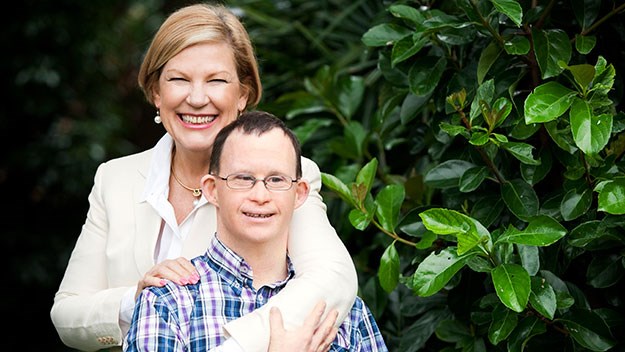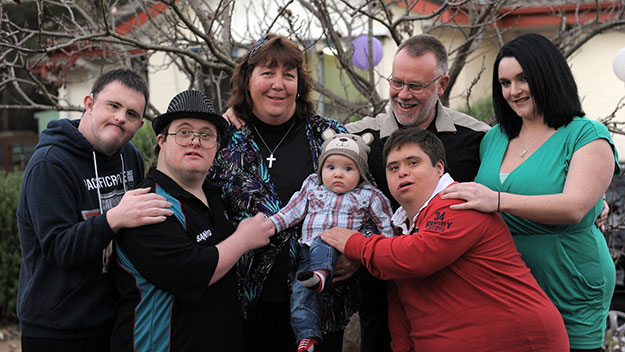Ann Sherry, former prison social worker and current chief executive of cruise operator Carnival Australia, was named Australia’s most influential woman at the 2015 Australian Financial Review and Westpac 100 Women of Influence Awards last night.
Sherry was formally first assistant secretary of the Office of the Status of Women, and Australia’s representative to the UN’s forums on human and women’s rights.
Sherry’s influence in corporate Australia started at Westpac, where she helped make it the first private-sector bank to introduce paid maternity leave, and in her current role as Carnival Australia CEO, she has boosted annual cruise numbers from 100,000 to over a million.
Sherry’s biggest personal accomplishment is raising her only son, Nick, who has Down syndrome. The Weekly spoke to Ann last year about her gorgeous relationship with her special boy.
Read the full story below.
She is one of Australia’s most accomplished chief executive officers, but her greatest achievement is seeing her son, Nicholas, flourish, writes Michael Sheather.
Standing in the ornate vestibule of his family’s home, Nick Hogan throws his arms around his mother, Ann Sherry – head of cruise line Carnival Australia and one of Australia’s most respected businesswomen – in a hug of such force that it momentarily takes her breath away.
“I want to tell you something about my mum,” says Nick, 37, as though Ann isn’t sputtering in his arms.
“She loves hugs. She loves Christmas. She loves her mum. She loves big family get-togethers and she loves telling jokes. But most of all, she loves hugs, which is just fine by me because I love hugs, too.”
Nick Hogan is Ann’s only son and he has Down syndrome. Nick’s father and Ann’s husband, Michael Hogan, is just a few metres away, applauding.
“Nick is a charmer,” says Ann. “He always has been. And always a bit of a clown. God knows where he gets that from.” This is Ann Sherry as very few people see her, at home in the bosom of her family. Many Australians would be more familiar with Ann’s public face as one of Australia’s most respected CEOs.
Ann is the woman credited with introducing maternity leave to corporate Australia in the mid-’90s when she was an executive at Westpac, the former head of the Bank of Melbourne and the first woman to run a bank in New Zealand.
Nick has his own apartment alongside Ann and Michael’s home, west of Sydney, and a growing independence.
“Having Nicholas in our lives is one of the most important, wonderful things that has ever happened to us,” says Ann. “He has taught us so much, not just about disability and what it is to live with it, but also about ourselves, about love.
“He taught me that the world isn’t as neat as it seemed when I was growing up, that people have difficult lives thrust upon them. Nicholas was probably the greatest wake-up call of my life.”
From the time she brought him home as a baby, Ann was determined that Nick’s disability would not stop him having a wonderful life.
“We said that Nick may have a disability, but he won’t be locked away,” says Ann. “We were young, too, and we didn’t want our lives to end at that moment. We had a view that what we did, he did and where we went, he went. I wanted to work so I wasn’t going to stay at home. I’m not a stay-at-home kind of mother, anyway. So we made it all work around us.”
Ann grew up in Gympie, in rural Queensland. Her parents, John and June, were pharmacists. They moved to Brisbane in the early ’70s when Ann’s father bought a large chemist shop.
With her family background, no one was surprised when she went to university, first to study radiology, but later switching to an Arts degree, majoring in politics and economics.
“A whole new world opened up to me,” she says. “And it was a much bigger world than I was used to, where governments and economies interacted. It was a time when our lecturers were questioning the way things were done.”
She also fell in love with Michael Hogan, a young Law student. “He was so different to anybody I knew,” says Ann.
“He was charming. He invited me to see the blues singer John Mayall. I didn’t even know who John Mayall was, but I went anyway.
“I think you are lucky if you find someone like I did with Michael. I used to say I’d never get married, that I would pave my own way. Then, there I was at 18 and a half, deeply in love.”
They married in January 1975 and Ann fell pregnant a year later. Nick was born in September 1976, when Ann was halfway through her degree. At the time, doctors said he had an “unidentifiable disability”.
“Ann was devastated, there is no other way to put it,” says Michael, 63, now semi-retired after a career in public affairs. “I was, too. It’s difficult to express the way you feel as a young couple when your child is born with a disability. There’s guilt, there’s anger and there’s a persistent question that hangs over everything: how are we going to deal with this?”
There were no easy answers. “As a woman of 21, the last thing that I expected was to have a child with Down syndrome,” says Ann.
“The assumed knowledge at that time was that kids with Down syndrome were born to women over 40, not women of 21.”
Ann went through 24 hours of deep mourning after Nick’s birth. At the time, it was still possible to put children with disabilities into institutions.
“There was quite a bit of talk along those lines, even from the doctors, who knew my parents and said that it could be arranged.”
Then, a ward sister came to her bedside. “She was a pragmatic old-world nursing sister,” says Michael.
“She sat down with Ann and said, ‘You have a baby. You are a mother. He has a disability. He needs you. And you need him. Get on with it’.”
It was an epiphany. Ann and Michael took their baby home. For the next few years, both of them juggled studies and jobs with caring for Nick. It was far from easy.
“Up to that point, we had been looking at challenging things to do with our lives,” says Ann. “This is what presented itself. We had to grow up really quickly. I went from being 21 and gaga to 21 with a great responsibility.
“Of course, I started encountering other families with kids who had disabilities. We got access to good services because I was articulate and had family connections, but the truth is, a lot of the services weren’t that good. I learned a lot in a very short time.”
They decided not to have more children. “We didn’t think we should roll the dice again,” says Ann. Childcare was always a problem. “It often cost us more money than one of us was earning to make it work,” she says. “But it meant Nick had social contact with other children. And he needed that. We needed to work, too.”
Eventually, she found a family day-care mother, the aunt of rugby league player Wally Lewis, to care for Nick.
“She was a godsend,” says Ann. “She wasn’t fazed by Nick’s disability at all. She created a wonderful environment for him with other children at her home. And she was a good woman, who I trusted.”
At the same time, she and Michael knew they had to develop Nick’s motor skills so he could get a good education.
“Education really required Nick to stand, to walk and to speak, so before he went to school, we spent a lot of time doing physiotherapy to improve his muscle tone,” says Ann. “He couldn’t see very well either. But Michael spent a lot of time playing sports with him in the backyard – football, basketball, anything that involved a ball. The result was that he had good hand-eye co-ordination before he even had glasses.”
Nick attended special school from the time he was about eight. A friendly, open boy, he made many friends in his local neighbourhood when Ann was working in Melbourne as a trade union official and later as a department head with the Victorian public service. Many of those friends remain close to Nick today.
The family lived an almost gypsy-like existence, as Ann moved from one successful job to another, from Melbourne to Canberra, where Ann worked in the Keating government’s Office of the Status of Women, and even to New York, where she represented Australia on women’s rights and human rights, before she became an executive at Westpac in 1995.
Their ideas for Nick’s future became focused on independence about 12 years ago when, at the age of 25, he started work as a retail assistant at Harris Farm Markets. “Nick began to blossom,” says Ann. “He loved his job. And he got to meet a lot of wonderful people.
“We had this idea that he might be able to live by himself, that was the plan. The idea was that Nick would move out – the apartment was just down the road from where we lived – and he could really live his own life and we wouldn’t be far away if he needed us.”
When the time came, about six years ago, there was a major hurdle.
“He said he didn’t want to move out,” recalls Ann. “I knew from the tone in his voice that he meant it, too. I said, ‘So, why did we buy the apartment?’ And he said, ‘I didn’t buy it – you did’.” Ann and Michael had to reshape their vision of Nick’s future and make it his vision.
“Of course, we think about what will happen in the future,” says Ann. “That has always been at the back of our mind. We’re lucky that we have the means to provide well for him.”
Two years ago, Ann and Michael stumbled on The Abbey, a magnificent eight-bedroom, sandstone mansion not far from Sydney’s CBD that needed extensive repairs. “We came back to the idea that what we need is a place that is big enough for Michael and I to have a space and for Nick to have a space, but with a common environment,” says Ann.
Ann and Michael have started a long renovation, which is about 70 per cent complete. Nick has moved into his own apartment, inside the walls of The Abbey, but outside the main building.
“That was a keen part of the attraction,” says Ann. “For the past seven years, he has been with Ruth, his girlfriend, and she has been staying with him. They met at work and are great together.”
Ann helped to design Nick’s apartment, with an eye on safety and ease of access.
“Everything there is simple,” she says. “The kitchen is easy to use and we’ve made sure you can’t start a fire.”
So far, the renovation has cost a fortune and there is much that still needs to be done. “It will probably chew up everything we earn, but in a way, it doesn’t matter,” says Ann.
“The joy that we saw on Nick’s face when we moved his furniture into his apartment – that makes it all worth it.”


